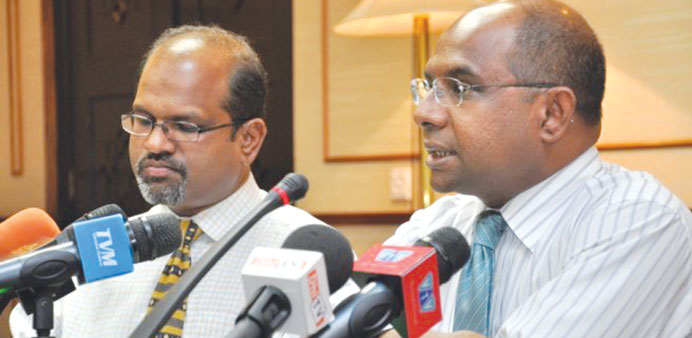IANS/AFP
The sentencing and deposing of Maldives election commissioner Fuad Thaufeeq is unlawful and without any proper procedures, parliament speaker Abdullah Shahid and deputy speaker Ahmed Nazim said in a joint statement, media reported yesterday.
The statement was issued on Monday, after the speaker and deputy speaker wrote a letter to President Abdulla Yameen, Chief Justice Ahmed Faiz and Attorney General Mohamed Anil that the Supreme Court’s verdict against the election commissioner was issued unlawfully, Haveeru online reported.
According to the parliament secretariat, the two had come to the conclusion after reviewing the court’s verdict from a legal perspective.
The Supreme Court on Sunday issued a suspended six-month prison sentence to Thaufeeg, and sacked him and his deputy. The prison sentence has been suspended for three years, according to Xinhua.
The court also ordered the commission to make all arrangements for the upcoming parliamentary elections within the next six days, and hold the elections on March 22 as scheduled.
The Maldives Supreme Court has repeatedly come under fire from the international community for failing to meet international standards and has been accused of attempting to undermine the independence of the election commission.
US slams sacking: The United States led international criticism of the Maldives yesterday after the island nation’s top court sacked its election commissioner two weeks before polls, questioning its
commitment to democracy.
The US State Department accused the Supreme Court of overstating its powers and undermining the election commission after Fuwad Thowfeek and his deputy were sacked on Sunday for “disobeying and
challenging” its orders.
“These actions (of sacking) represent an unprecedented expansion of judicial powers which undermines an independent democratic institution that has made laudable efforts to hold multiple successful elections despite previous judicial interference,” State Department spokesperson Jen Psaki said in a statement.
“The Supreme Court’s insistence on holding parliamentary elections on March 22 while imprisoning the very official responsible for holding those elections calls into serious question the government’s commitment to democracy,” she said.
The ruling has reopened the controversy over last year’s presidential election on the honeymoon islands, when Supreme Court judges annulled the results of a first round won by former president Mohamed Nasheed, and then cancelled two other polls at the last minute.
Nasheed lost last year’s presidential elections to the half-brother of Maumoon Abdul Gayoom, the former strongman who ruled the Indian Ocean
archipelago for 30 years.
Abdulla Yameen won the November 16 presidential vote, five years after the island nation introduced multi-party
democracy.
Nasheed’s main opposition Maldivian Democratic Party (MDP) has slammed Sunday’s sackings as ridiculous and is now deciding whether to carry out a threat to boycott the March 22 parliamentary polls.
Britain said it was “closely following” developments, while Canada warned the move could jeopardise the nation’s
“democratic transition”.
“An independent and effective election commission is an essential element in any genuine democracy, and undermining the commission and its ability to function again places the Maldives’ democratic transition in question,” the Canadian foreign ministry said.
UN Secretary-General Ban Ki-moon expressed concern over the sackings, while also calling for peaceful and credible elections later this month.
“The secretary-general underlines the importance of respect for the principle of separation of powers, the rule of law, and the independence of constitutionally established bodies,” his office said in a statement.
Gayoom had appointed most of the current judiciary before being defeated by Nasheed in the islands’ first democratic polls in 2008 and foreign diplomats regarded the delays last year as a politically-motivated ploy to prevent Nasheed’s return to power.
The Maldives, better known for its upmarket tourism, had been hit by political instability after Nasheed was forced to step down in February 2012 in what he says was a military-backed coup orchestrated by Gayoom loyalists.

